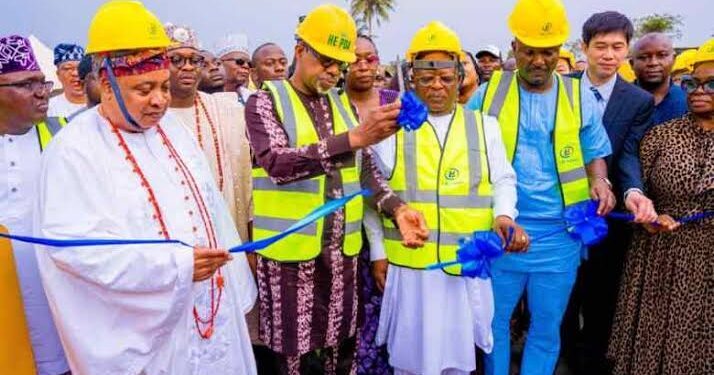This includes Section One and the Lagos-Sagamu route in Lagos and Ogun, Phase Two.
Tinubu highlighted the importance of road infrastructure for socio-economic development.
He reaffirmed his administration’s commitment to improving the country’s transport network to enhance mobility and economic growth.
The President stated: “There is no doubt that road infrastructure plays a fundamental role in the socio-economic development of any nation.”
Quoting Norman Foster, he added: “Infrastructure is much more than roads and bridges; it is the foundation that sustains economic growth, facilitates mobility, and enhances the quality of life.”
He stressed his administration’s commitment to linking rural roads to urban centres, commercial hubs, and industrial corridors to maximise the nation’s resources and mineral deposits.
Tinubu, represented by Ogun governor, Dapo Abiodun, said: “This strategic approach aligns with the Federal Government’s Renewed Hope Agenda.
“We are committed to rebuilding, expanding, and modernising our national road networks, railways, and airports, all vital to economic prosperity.”
He praised the Minister of Works, Sen. Dave Umahi, for his dedication. He described Umahi as “the actualiser of our vision on road infrastructure” and “a right fit for purpose.”
Umahi noted that the President, represented by the Ogun governor, will inaugurate both the completed/ongoing 24km section and the upcoming 48km section, ensuring momentum in spite of incomplete procurement.
He confirmed that palliative work had been undertaken as temporary repairs. “What we are doing today is part of the Lagos-Ibadan project, Phase Two,” he said.
Umahi outlined key components, including the Ogun River, Marlboro underpass, Wawa underpass, Arepo underpass, Sagamu-Iperu (24km), RCC Church interchange, two flyovers, and five pedestrian bridges.
“The next phase, which the representative of the President will flag off, is 48km by two, extending from Iperu to Ijebu Ode along the Sagamu-Ore route,” Umahi added.
He confirmed that the full 96km (48km by two) would be inaugurated, alongside completed palliative works, to maintain project continuity.
Umahi explained that the second part of the 48km stretch (Iperu to Ijebu Ode) faced a procurement issue. The process was flawed and required resubmission to the Bureau of Public Procurement (BPP) with a 30-day turnaround.
“The second leg of Phase Two, Section Two, of Lagos-Ibadan was wrongly procured. I directed its resubmission to the BPP, and in 30 days, work will commence.
“The governor of Ogun, representing the President, will flag off both phases, even though Phase Two is not fully procured. In 15 days, the project will be awarded.
“It is better to flag off both today from Iperu, where the first 24km stops, to Ijebu Ode,” he said.
Umahi thanked the governor for his support and emphasised the project’s national significance. (NAN)











